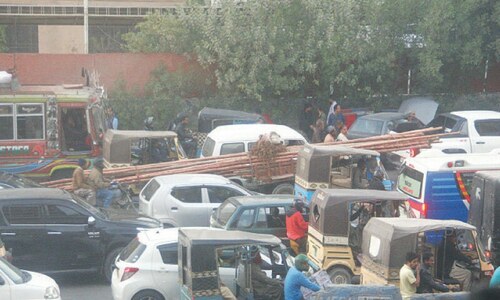KARACHI, Sept 4: The Sindh High Court on Wednesday was informed that a street close to the Bilawal House, the Karachi residence of President Asif Ali Zardari in Clifton, was blocked due to security reasons as there were threats to the life of the president.
However, the court directed the authorities to ensure that freedom of movement of citizens as guaranteed under the law was not affected by placing barricades in the city on the pretext of security concerns.
A two-judge bench comprising Chief Justice Mushir Alam and Justice Aftab Ahmed Gorar was seized with the petition of Advocate Rashid Akhtar Qureshi against the blockades installed near the Bilawal House and in other parts of city for security reasons.SSP-South Nasir Aftab submitted that there were threats to the life of the president as reported by intelligence agencies and the road from the Bilawal Chowrangi to the Park Towers, a shopping centre, was blocked.
However, he said, alternative routes were arranged to facilitate the public.
The SSP stated that several foreign missions were located in different parts of District South as there was no separate place or diplomatic enclave built for them.
He said that streets leading to certain foreign missions and consulates were blocked as they were under threat as per the intelligence reports.
The court observed that it was well aware of the fact that it was the responsibility of the government to provide safety to dignitaries, but it also knew that right of freedom of movement of citizens was also guaranteed as envisaged under Article 15 of the Constitution.
The bench directed the SSP to bring concern of the court to the notice of the local administration.
The bench observed: “It is expected that local administration will obey the constitution and law in terms of the Article 15 of the Constitution which ensures freedom of movement and take measures to protect dignitaries”.
The bench directed Advocate General Khalid Jawed to look into the matter and assist the court in this regard.
The court also issued notices to the president of the SHC Bar Association and the secretary of the Sindh Bar Council, asking them to assist the court in this regard.
The hearing was adjourned to a date to be later fixed by the court’s office.
Intercity bus terminal case
The same bench directed the chief secretary to take notice of encroachments on the land for an intercity bus terminal.
The bench also expressed its dismay at the slow pace of work at the project.
The bench observed that the issue of transfer of the bus terminal was under consideration of the court since 2004 and various orders/directions were issued but to no avail. “It seems that there is no will on the part of either Government of Sindh or the CDGK, now the KMC, to resolve this long outstanding issue,” the bench remarked.
The bench went on to observe that even land dedicated for the intercity bus terminal was also “allowed to be encroached upon” and the “administration has been too culpably favourable to encroachers and violators of law”.
The court observed that the silent majority of people were suffering as the administration was “friendly to the encroachers”.
It said that one could not rule out that the officials in administration had developed their personal interest in encroachments as no measures were being taken to check encroachment on public property.
The bench directed the chief secretary, local government and revenue secretaries to decide once for all the modality and mechanism to complete the project.
It suggested that the possession of the land should be handed over to the city government for the time being and issue of departmental funding may be resolved as delay in project was causing colossal losses to the public and the provincial government.Petitioner Islam Hussain had moved the SHC through a constitutional petition seeking shifting of the intercity bus terminal to the outskirts of the city.
He said that 45 acres were allotted for the terminal that would cater to thousands of passengers travelling by over 3,000 buses to and from Karachi from every part of the country daily.
The petitioner stated that this would be the second bus terminal after the Yousuf Goth terminal built for Quetta-bound buses. After its completion, he said, all the bus stands located at Saddar and in other parts of the city would be shifted to the new terminal.
He said that the air and noise pollution and traffic congestion in the city had become unbearable due to the absence of control on the vehicular traffic.
He said despite the construction of the new bus terminal, Balochistan-bound buses were still using many places in Saddar and Lyari as terminals.















































Dear visitor, the comments section is undergoing an overhaul and will return soon.